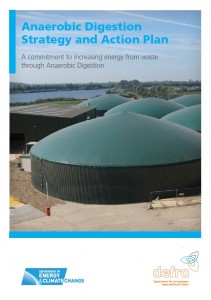 The Government made a commitment to work towards a ‘zero waste’ economy in the Coalition Programme for Government of May 2010, and to introduce measures to increase energy from waste through anaerobic digestion (AD). Defra published a Framework Document in November 2010 which aimed to set out the necessary steps to achieve this.
The Government made a commitment to work towards a ‘zero waste’ economy in the Coalition Programme for Government of May 2010, and to introduce measures to increase energy from waste through anaerobic digestion (AD). Defra published a Framework Document in November 2010 which aimed to set out the necessary steps to achieve this.
Government and industry have since then worked closely together to identify barriers to development of AD and the actions needed to overcome them; resulting in the AD Strategy and Action Plan.
A significant number of actions are aimed at improving the dissemination of information and other actions related to developing best practice, providing an agreed framework for skills and training, and further work to deal with specific technical or regulatory barriers. Delivery and implementation of the Action Plan is monitored and reported by Defra.
The AD Strategy & Action Plan for England was published in conjunction with the Waste Review. Wales, Northern Ireland and Scotland, while working within the same legislative framework, are responsible for their own waste and energy from waste policies and delivery.
Delivery
Annual progress reports are published on the Government website; 2011/12, 2012/13, 2013/14.
Actions fall broadly into three categories;
- Improving our knowledge and understanding
- Smarter working models
- Regulation and finance
The actions were summarised in Table 2 of the main Strategy document and explained in more detail in a supporting document. Summaries of the action updates and outputs are provided below, grouped by workstream for ease.
Workstream 1: Improving our understanding of the AD landscape
This workstream was led by NNFCC and this Information Portal was one of the primary outputs resulting from the review of available data and information.
1 – AD Baseline Report, capturing the current status of the industry (published September 2011)
2 – AD landscape information, via Biogas Map (updated monthly)
4 – AD & Composting Research Network (ADCORN) matrix of Government sponsored research
6 – WRAP launched a food waste collection demonstration fund, December 2011
Workstream 2: Building UK Skills
8 – AD training provision matrix
12 – AD Competency matrix, for providers and operators
13 – AD Operator Competence decision tree, published March 2011
15 – Process Safety Terminology, explaining common terms and relevance to AD
16 – Benefits to Employers Report, study shows that training costs are quickly recouped upon completion of apprenticeships
Workstream 3: Building safe and secure markets for digestate
20-23 – A series of project facilitated by WRAP
Workstream 4: Raising awareness of AD – community AD and localism
30 – Case Studies, showcasing best practice from a range of scales and types of AD
32 – ‘Driving Innovation in AD’ launched two rounds of Challenge Funding (2011 and 2012)
33 – List of AD award schemes, published by CIWM
Workstream 5: Building markets for biomethane for transport fuels
34 – HGV Cost Modelling for Biomethane, LowCVP (Part 1 christian louboutin report)
Workstream 6: AD in the rural community
36 – Energy Market Issues for Biomethane (EMIB) Group, addressing gas grid injection issues
38 – Report from workshop on ‘Purpose Grown Crops’ (Nov 2011) considered for Bioenergy Strategy
39 – Biomass and Biogas Carbon Calculator, available from NNFCC
Workstream 7: Finance
42 – List of financial schemes available to AD projects, in conjunction with private and equity finance
46 – AD Loan Fund, launched July 2011 (now closed)
47 – AD Due Diligence template, published by ADBA
Workstream 8: Regulation
49 – Revisions to SR2010 No.16 completed
55 –56 – A series of meetings held on Planning Reform; first at DCLG in May 2012
